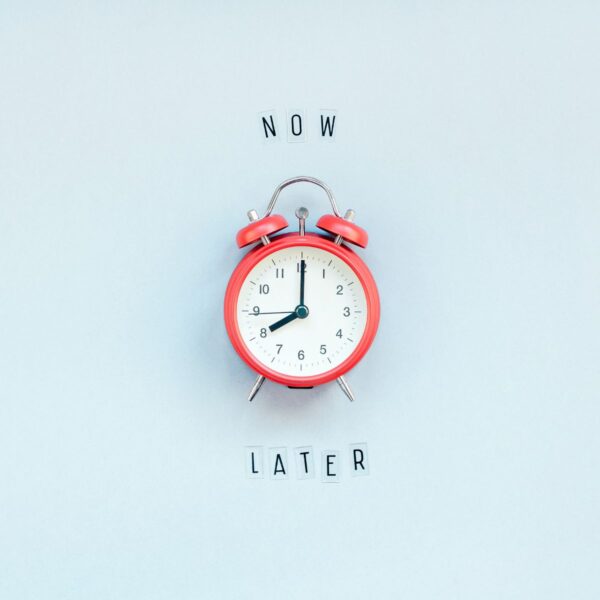Head's up, there could be affiliate links ahead!
I used to believe that procrastination was a sign of (my own) laziness or a lack of discipline. No matter what I tried to do to combat it, I could never seem to hold myself accountable, particularly when there was no consequences for not following through. In this blog post, I will explore the connection between ADHD procrastination, and the idea of self-accountability so that you know exactly what’s happening, the next time you find yourself procrastinating on something.
Why ADHD’ers Procrastinate
When it comes to understanding why we procrastinate, it’s essential to recognize that it’s not always about avoiding work. In fact, research suggests that procrastination often stems from a desire to escape negative emotions associated with a task.
For some, like myself, boredom becomes the primary emotion we seek to avoid. We will go to great lengths to sidestep any dull or monotonous task (like cleaning my entire house to avoid doing taxes). However, for many individuals, fear, anxiety, confusion, or imposter syndrome play a significant role in their procrastination habits.
The ADHD Factor: Emotions and Procrastination
For individuals with ADHD, the relationship between emotions and procrastination takes on a different dimension. While some people find motivation and focus through external deadlines, those with ADHD often need a deep emotional connection to a task in order to get it done – either interest, purpose or even pressure of an imminent deadline. The adrenaline rush that comes from working within a tight timeframe can be invigorating and enhance performance, but that can also come at a cost to our energy and mental wellbeing (hello, burnout!).

ADHD & Personal Accountability – Why it Doesn’t Work
We all know people that follow through on the things they say they’ll do because they are impeccable with their word. While that’s an admirable trait, it’s hard (although not impossible) for ADHD’ers to cultivate this strength, for a number of reasons.
- Because of temporal discounting or time blindness, we may not fully comprehend what we’re committing ourselves to.
- Because we tend to be impulsive and often inattentive, we may not be paying attention to the words of commitment coming out of our mouth.
- We have executive function challenges that make planning, task initiation, organization and follow through difficult.
So even though we have the best intentions to be accountable for our commitments, we may not have the resources available to do so.
For all these reasons, personal accountability can be a real challenge for ADHD’ers and we all know how horrible it feels to say we’re going to do things and not follow through. We disappoint ourselves and other people who are counting on us. This can lead to really negative thought spirals and obviously erodes trust.
But the reality is that, just because we have ADHD, we don’t get a free pass from being responsible for our commitments. We have to learn strategies to not only avoid procrastination and follow through on tasks, but perhaps more importantly, we have to be more aware of what we’re committing ourselves to in the first place.
Strategies for Managing Procrastination
For individuals with ADHD who struggle with procrastination, it’s crucial to develop effective strategies to navigate this behavior and maximize productivity. Here are some actionable tips:
1. Embrace Intrinsic Motivation
Find ways to cultivate genuine interest in the tasks you need to accomplish. Intrinsic motivation plays a significant role in combating procrastination. Take the time to understand the underlying reasons why a task matters to you and focus on the value it brings to your life or work.
2. Leverage the Power of Deadlines (From Others)
When ever possible, try to get a specific deadline if someone is only casually asking you to do something. If your boss says “hey, can you do a report for me?” and you ask when they want it, don’t settle for an answer that is ambiguous. “Whenever you can get it done” is the worst way to motivate an ADHD’er. Keep asking until you get a specific date and time.
3. Tap Into Your Intuition
If you want to do something, but no one is asking you to do it, and as a result, you’re procrastinating on it, ask yourself WHY you want to do it in the first place. Is it that it sounds like a good idea? That’s great in theory, but if you only want the result and you don’t want to engage in the process, then it’s time to have a talk with yourself about how badly you want it.
4. Get Honest With Yourself
If you tend to notice this trend of wanting to do things, but never getting started because you’re not under pressure, then start noticing when these thoughts come up. Are you seeking out distractions? Why do you need a new bright, sparkly thing? What might you be avoiding? When you start to notice patterns, you can start being honest with yourself that yes, you might want a certain outcome, but you know yourself well enough to know it’s not going to happen because you don’t want it badly enough.
Self acceptance is a beautiful place to get to!
Final thoughts on ADHD + Procrastination
I know how frustrating it can be to struggle with procrastination, but the crazy thing about procrastination is that the more you emotionally struggle with it, the worse it can get! As we now know, emotion plays a role in our ability to get things done, so reframing self-criticism into self-awareness is a great first step.
That means, if you know you’re prone to procrastination, take some time to use the suggestions above build in the support you need to get started, and finish your tasks. The more you know about what holds you back, the better you’ll get at managing it.






Leave a Comment